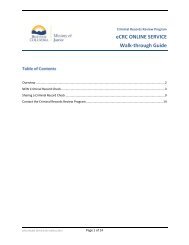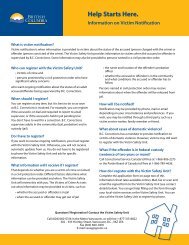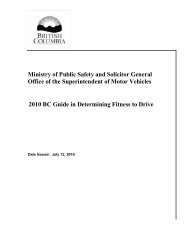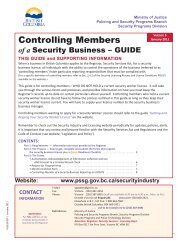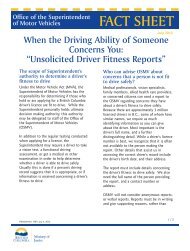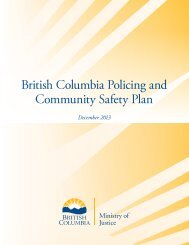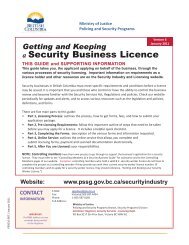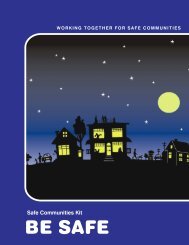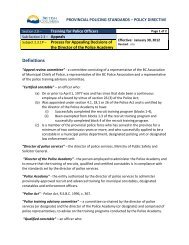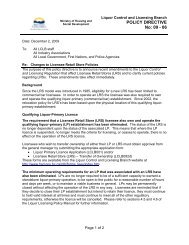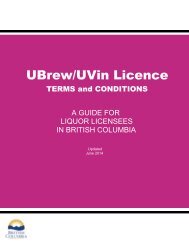Community Accountability Programs Information ... - Ministry of Justice
Community Accountability Programs Information ... - Ministry of Justice
Community Accountability Programs Information ... - Ministry of Justice
- No tags were found...
You also want an ePaper? Increase the reach of your titles
YUMPU automatically turns print PDFs into web optimized ePapers that Google loves.
• <strong>Information</strong> on the justice system, court accompaniment, and thirdpartyreports• Referrals to other resources• Services specific to particular cultural communitiesYou will find a directory <strong>of</strong> victim services programs at the following Website: http://www.pssg.gov.bc.ca/victim_services/index.htm.In addition to this network <strong>of</strong> programs, the Victim Services Divisionprovides the following support services:• VictimLINK (1 800 563-0808) is a 24-hour, toll-free, multilingual,province-wide telephone service that provides support and informationto victims <strong>of</strong> crime. VictimLINK provides information and referralservices to all victims and immediate crisis support to victims <strong>of</strong> familyand sexual violence.• The Crime Victim Assistance Program (1 866 660-3888) provideseligible victims, immediate family members, and witnesses withfinancial and other benefits.A caution about power-based crimesIn Part 1 <strong>of</strong> this manual, the caution was made that <strong>Community</strong> <strong>Accountability</strong> <strong>Programs</strong>should not handle cases that involve violence against women in relationships, sexual <strong>of</strong>fences,child abuse, or hate crimes.These crimes are <strong>of</strong>ten referred to as “power-based crimes.” These are crimes in which<strong>of</strong>fenders abuse the power they hold over the victim, and the victim feels powerless toresist, avoid, or even speak about what is going on. The power that these <strong>of</strong>fenders wieldmay be physical, emotional, psychological, social, or financial in nature, and is <strong>of</strong>ten basedon gender, age, relationship, ability, race, country <strong>of</strong> origin, sexual orientation, or physicalsize. Most victims <strong>of</strong> crime feel that their ability to make a free choice has been diminishedas a result <strong>of</strong> the experience. Victims <strong>of</strong> power-based crimes feel this more acutely. Hence,they usually require more attention and intensive support than can be provided by a<strong>Community</strong> <strong>Accountability</strong> Program.Guidelines for Working with Victims and Offenders 23



